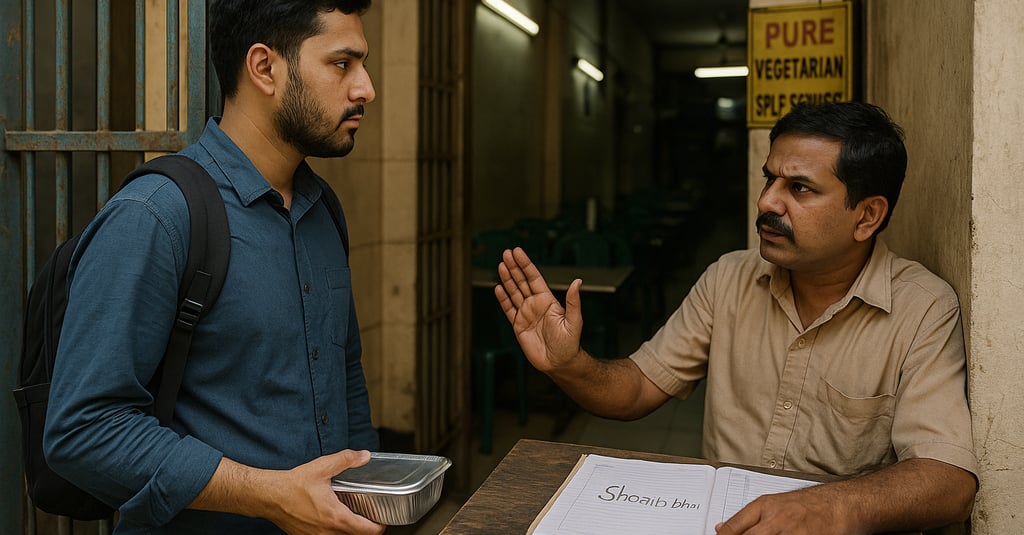When a Name Becomes a Barrier to a Meal
In this deeply personal and powerful reflection, Shuaieb shares his experience of being quietly excluded from a restaurant — not because of his actions, but simply because of his name. What began as a simple takeaway order turned into a moment of painful realization about identity, profiling, and belonging. Through this story, he draws a powerful connection to historical injustices and the invisible walls that still exist today. A must-read on empathy, social bias, and what it truly feels like to be told, you don’t belong here.
Shuaieb Khan
7/21/20252 min read


Today I experienced something that’s still sitting heavy on my heart.
It started off like any other day. I stopped by a bhojnalaya in Lower Parel — a place I often pick up food from. I’ve never eaten inside, but something about their cooking has always intrigued me — the simplicity, the style, the conscious use of ghee instead of oil, barely any spice. It’s different, calming even. I respect that kind of food culture deeply. Maybe even admire it.
Being a Muslim, I’ve always been careful. I never entered their dining space. I place my order, wait outside, collect my parcel, pay, and leave. No questions asked. It’s my way of being respectful — not wanting to step into a space where I might unknowingly make someone uncomfortable. I get it — purity, rituals, certain dietary rules — I was raised with similar values too.
But today was different.
I went to place an order — not to dine in, just to pack a thali like always. There was a man at the entrance who noted down names before letting anyone inside (a bit odd for a food joint, but fine). He asked for my name. I said, “Shuaieb.”
Without missing a beat, he said,
“Shoaib bhai, aapko main sirf parcel de sakta hoon. Yaha baith ke khane nahi de sakta.”
I nodded. Didn’t argue. Told myself it’s okay — I wasn’t going to eat there anyway. Took my food and left.
But it hit me two hours later — and it hit deep.
It wasn’t about the thali. It was about that one sentence — the weight it carried. That quiet rejection. That sharp but calm reminder that my name alone was enough to decide where I’m allowed to sit.
I understand the idea of sacred spaces. I do. I know there are rules. But this wasn’t about purity. It was profiling. Plain and simple. Someone else — who could’ve just had chicken across the street — could walk in with no questions asked. But me, just because my name sounded like it doesn’t belong, was told to stay out.
It wasn’t about religion. It was about identity. My name became a boundary.
I didn’t walk in loudly, I didn’t demand anything. I was just a guy trying to order a meal. And for a second, I stopped being a customer. I became “someone they’d rather not have inside.”
That feeling stayed with me.
That ache of being quietly pushed to the side. Like I didn’t fit. Like I wasn’t clean enough, pure enough, good enough to share the same table. Like I was untouchable.
And in that moment, I swear, I got a glimpse into something deeper.
I could feel what it must be like for someone poor being turned away at a high-end restaurant. I could feel what it must be like for someone lower-caste not being allowed to touch your stuff. I could feel the pain behind those old colonial signs that once said,
“Dogs and Indians not allowed.”
That sharp, helpless sting when you realize it’s not about what you’ve done, but just about who you are.
And I still admire the food. Still respect their discipline. But today, I walked away with more than just a parcel. I walked away with a truth most of us try to ignore:
Sometimes, you don’t need a wall to be excluded. Sometimes, just your name is enough.
